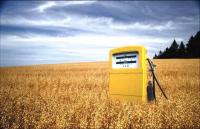Two comprehensive studies in Science magazine have concluded nearly all biofuels used today trigger more greenhouse emissions than conventional fuels if the emission costs of producing these so-called “green” fuels are calculated.
The studies take the first detailed look at the impact on emissions of converting natural land to cropland around the globe to support biofuels development – dashing hopes for the once-popular alternative energy source.
Destruction of natural ecosystems to produce biofuels not only releases greenhouse gases through burning and plowing but also deprives the planet of natural sponges to absorb carbon emissions, the Science studies concluded.
Cropland absorbs far less carbon than the rain forests or scrubland it replaces, and production of all biofuels has resulted, directly or indirectly, intentionally or not, in new lands being cleared, either for food or fuel.
“When you take this into account, most of the biofuel people are using or planning to use would increase greenhouse gasses substantially,” said Timothy Searchinger, lead author of one of the studies and a researcher in environment and economics at Princeton University. “Previously there’s been an accounting error: land use change has been left out of prior analysis.”
Plant-based fuels were considered better than fossil fuels because carbon released from burning was balanced by carbon absorbed when the plants grew. But that equation overlooked the fact turning plants into fuels causes its own emissions — for refining and transport, for example.
Grassland clearance releases 93 times the greenhouse gas that would be saved by the fuel made annually on that land, said Joseph Fargione, lead author of the second paper, and a scientist at the Nature Conservancy. “So for the next 93 years you’re making climate change worse, just at the time when we need to be bringing down carbon emissions.”
The European Union has tried to address the land-use issue with proposals stipulating that imported biofuels cannot come from land that was previously rain forest. But even with such restrictions, Searchinger’s study shows, the purchase of biofuels in Europe and the U.S. leads to destruction of natural habitats far afield.
“This land-use problem is not just a secondary effect — it was often just a footnote in prior papers,” he said. “It is major. The comparison with fossil fuels is going to be adverse for virtually all biofuels on cropland.”
So the stakes in the climate-change struggle just got raised.
Subscribe to our newsletter
Stay up to date with DeSmog news and alerts






